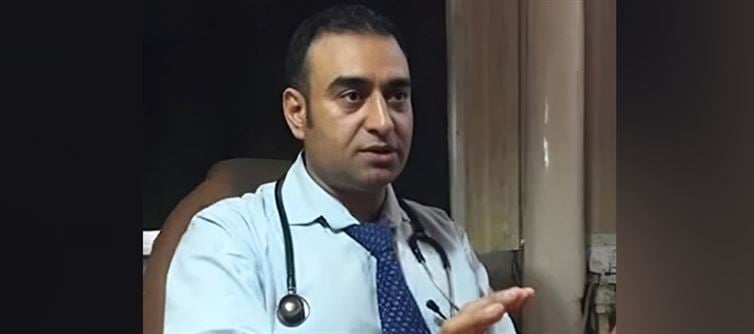
🔥THE CASE THAT HAS LEFT THE PUBLIC DEMANDING ANSWERS
In november 2023, media outlets across the country reported that Dr. Nisar-ul-Hassan, an Assistant professor at SMHS Hospital, Srinagar, was dismissed by the J&K administration, citing alleged links to anti-national activities.
Whether those allegations were proven or not is a matter only courts can establish — but the dismissal itself raised eyebrows nationwide.
But what has stirred controversy again is this:
Despite the cloud of allegations reported in the press, he was later appointed as a professor at a hospital in Faridabad, right in the heart of NCR.
This brings us to two explosive questions the public is now asking:
1️⃣ If allegations were serious enough to warrant dismissal, why were they never tested through legal prosecution?
2️⃣ How did a person removed under such serious circumstances end up in a teaching position at another major hospital, with no system flagging it?
The answers reveal something even bigger:
A massive gap in India’s institutional coordination, background verification, and national security screening.
📌 THE DISMISSAL: A DECISION THAT RAISED MORE QUESTIONS THAN IT ANSWERED
The Lieutenant Governor’s administration removed the doctor from service, citing “serious concerns” — something the media widely reported across national platforms.
But here lies the central dilemma:
If an allegation is serious enough to cost a person their career… why is it not serious enough to be examined in court?
Dismissal is an administrative action, not a criminal adjudication.
It neither proves guilt nor establishes innocence.
And yet, when allegations involve national security concerns, administrative action alone cannot suffice.
If the evidence was strong, why no prosecution?
If the evidence was weak, why the dismissal?
Both scenarios point to serious inconsistencies in due process.
🏥 THE SECOND SHOCK: APPOINTMENT IN NCR
When someone faces an administrative dismissal on grounds reported as severe, standard protocol in most countries involves:
✔ security clearance
✔ background re-verification
✔ cross-state information sharing
In India?
There is no unified system linking hospital recruitment with national security alerts.
Which is how — if media reports are accurate — a doctor dismissed in one union territory can be appointed as a professor in another state with zero obstruction.
This is not a failure of one hospital.
This is a failure of the system.
🔍 THE REAL QUESTIONS NO ONE IS ASKING
Instead of speculating about motives, the real questions are:
1️⃣ Why is there no unified national verification system for medical recruitment?
Healthcare institutions handle sensitive populations.
Background checks cannot be optional.
2️⃣ Why was no transparent legal process initiated after the dismissal?
If allegations exist, they must be tested.
If they cannot be proven, a person’s career should not be destroyed by implication.
3️⃣ Why is there such weak information flow between states and the Centre?
A dismissal in J&K should not become invisible in Haryana.
4️⃣ Why do institutions rely on paperwork instead of intelligence inputs?
The lack of integration between civil recruitment and security agencies is alarming.
🚨 THE NCR CONCERN: NOT ABOUT ONE HOSPITAL — ABOUT THE ENTIRE SYSTEM
Some online commentators have gone to the extreme of calling the faridabad institution a “rehabilitation centre” for dangerous elements — but such claims are unverified and must not be accepted without evidence.
The real issue is not the hospital.
The real issue is the national blind spot.
India is a country with:
• terror recruitment cases
• sleeper-cell networks
• infiltration attempts
• radicalisation risks
Yet basic background verification between states remains primitive.
You don’t need conspiracy theories to be alarmed —
You just need to look at the structural vacuum.
⚠️ THE SYSTEM IS EASY TO EXPLOIT — AND THAT’S THE REAL THREAT
Here’s the danger:
If a person removed from one institution can walk into another high-trust position without scrutiny…
… what stops anyone else from doing the same?
The loophole is not in one hospital.
The loophole is in India’s fragmented, outdated, and uncoordinated background-check system.
And loopholes get exploited — not just by controversial individuals, but by genuinely dangerous elements.
💥 INDIA’S SECURITY MUST NOT DEPEND ON LUCK
This case — regardless of the individual’s innocence or guilt — exposes something much larger:
A nation cannot rely on administrative dismissals, fragmented data, and poor background checks to safeguard itself.
Whether the doctor is innocent or wrongly dismissed is for the courts to decide.
But the system?
The system is guilty.
Guilty of weakness.
Guilty of silence.
Guilty of leaving doors open.
India needs unified verification, legal transparency, and institutional communication — not patchwork reactions.
Because national security should never depend on paperwork alone.




 click and follow Indiaherald WhatsApp channel
click and follow Indiaherald WhatsApp channel